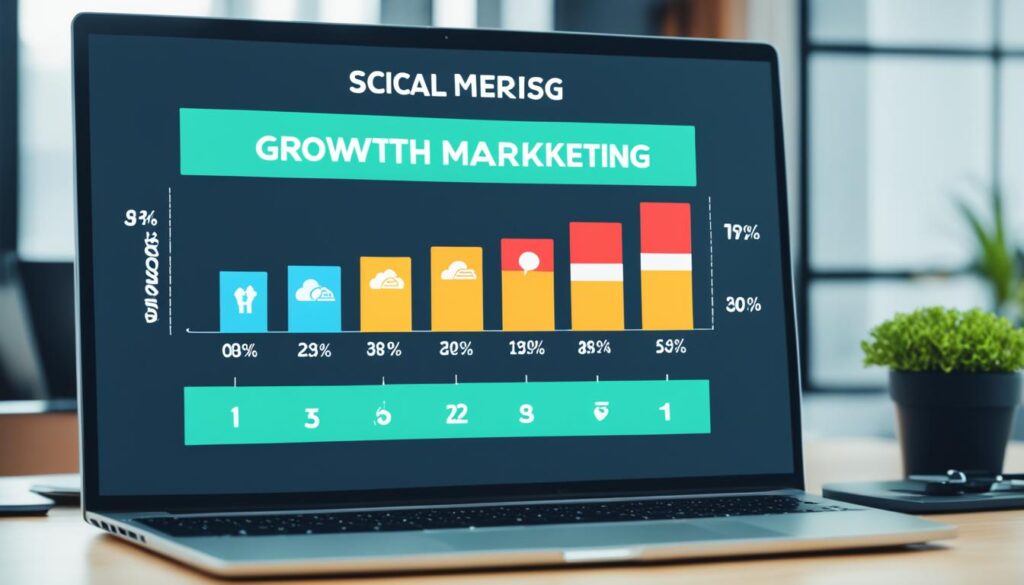Unlock Growth: Why Digital Marketing is Vital for SMBs
In an age where digital landscapes are continually evolving, small to medium-sized businesses (SMBs) are finding new avenues for growth through digital marketing. By utilizing the power of digital platforms, SMBs can unlock growth potential, expand their reach, and establish a strong online presence.
Key Takeaways:
- Digital marketing is essential for SMB growth and success.
- It offers cost-effectiveness and breaks geographical barriers.
- SMBs can benefit from targeted campaigns and measurable results.
- Engagement with customers can be improved through digital marketing strategies.
- Digital marketing provides flexibility and adaptability for SMBs.
Why is Digital Marketing Important for SMBs?
In today’s digital era, the importance of digital marketing for small and medium-sized businesses (SMBs) cannot be overstated. It offers numerous benefits and is a vital tool for SMB growth and success. Let’s explore why digital marketing is crucial for SMBs:
- Extends Reach: Digital marketing enables SMBs to expand their reach beyond traditional boundaries. With a well-crafted online presence, SMBs can connect with a wider audience and target potential customers who may have otherwise been out of reach.
- Cost-Effectiveness: Compared to traditional marketing methods, digital marketing offers a cost-effective solution for SMBs. Online advertising, email campaigns, and social media marketing often require smaller budgets but yield impressive results.
- Targeted Campaigns: Digital marketing allows SMBs to tailor their marketing campaigns to specific target audiences. By utilizing data analytics and customer insights, SMBs can create personalized and impactful marketing strategies that resonate with their ideal customers.
- Measurable Results: One of the biggest advantages of digital marketing is the ability to measure and track the results of marketing efforts. SMBs can monitor key performance indicators (KPIs) such as website traffic, conversion rates, and engagement levels to determine the success of their campaigns and make informed decisions.
- Improved Engagement: Through digital marketing, SMBs can engage with their audience in real-time. Social media platforms, email marketing, and interactive content allow SMBs to interact, build relationships, and respond to customer feedback promptly, fostering brand loyalty and customer satisfaction.
- Flexibility and Adaptability: Digital marketing provides SMBs with the flexibility to adapt their strategies based on market trends and customer behavior. It allows for quick adjustments to campaigns and the ability to test and optimize marketing efforts for maximum impact.
By embracing digital marketing strategies, SMBs can effectively compete in the digital landscape, reach new heights, and achieve long-term growth and success.
“Digital marketing offers SMBs a unique opportunity to level the playing field and compete with larger businesses in the online arena.” – Mark Johnson, Marketing Expert
Does Digital Marketing Really Work? Evidence and Case Studies
In today’s digital landscape, the effectiveness of digital marketing for small businesses cannot be underestimated. Let’s explore some evidence and case studies that highlight the benefits and advantages of digital marketing.
According to a survey conducted, 75% of small and medium-sized businesses (SMBs) that embraced digital marketing witnessed a significant increase in customer engagement and sales. This demonstrates that digital marketing strategies have a positive impact on business growth and success.
“Bake My Day,” a local bakery, provides a compelling case study. By leveraging Facebook ads to target their local customer base, they experienced a remarkable surge in foot traffic and online orders. This showcases the power of digital marketing to drive tangible results and generate revenue for small businesses.
The benefits of digital marketing for small businesses are undeniable. The ability to reach a wider audience, execute cost-effective campaigns, obtain measurable results, and enhance customer engagement are just a few of the advantages it offers. SMBs can leverage digital marketing strategies to boost brand visibility, expand their customer base, and outshine their competition.
Case Study: Bake My Day
To further illustrate the effectiveness of digital marketing for small businesses, let’s take a closer look at the success story of “Bake My Day.”
Objective:
- Drive more foot traffic to the bakery
- Increase online orders
Strategy:
- Create engaging Facebook ads targeting the local customer base
- Promote special offers and discounts
- Highlight the bakery’s unique products and services
Results:
| Metric | Before Digital Marketing | After Digital Marketing |
|---|---|---|
| Foot Traffic | 50 customers per day | 150 customers per day |
| Online Orders | 5 orders per week | 25 orders per week |
| Revenue | $500 per week | $2,500 per week |
The transformation experienced by “Bake My Day” is a testament to the effectiveness of digital marketing for small businesses. By strategically implementing digital marketing strategies, they were able to triple their foot traffic, increase online orders fivefold, and boost revenue.
These case studies exemplify how digital marketing can yield real, measurable results for small businesses. By embracing digital marketing, SMBs can unlock growth opportunities, expand their customer reach, and fuel their success in the digital realm.

Next, we will explore how small businesses can dive into digital marketing and unleash its full potential for their growth and success.
Getting Started: How Can SMBs Dive into Digital Marketing?
When it comes to digital marketing, small and medium-sized businesses (SMBs) may feel overwhelmed and uncertain about where to begin. However, with the right strategies and tools, SMBs can effectively navigate the digital landscape and unlock immense growth potential. Here are some essential steps to help SMBs dive into digital marketing:
- Set clear goals: Start by defining specific and measurable objectives for your digital marketing efforts. Whether it’s increasing brand awareness, generating leads, or driving sales, having clear goals will guide your strategy.
- Understand your target audience: Take the time to research and analyze your target audience. Identify their demographics, preferences, online behavior, and pain points. This insight will help you tailor your marketing messages and tactics to effectively reach and engage your audience.
- Choose the right tools: There are numerous digital marketing tools available, so selecting the ones that align with your goals and budget is crucial. Consider tools for website analytics, SEO, social media management, email marketing, and more, based on your specific needs.
- Craft your strategy: Develop a comprehensive digital marketing strategy that outlines how you will achieve your goals. This strategy should incorporate various tactics, such as content marketing, social media marketing, search engine optimization (SEO), paid advertising, and email marketing.
- Create engaging content: Content is king in the digital realm. Develop high-quality, relevant, and valuable content that resonates with your target audience. Whether it’s blog posts, videos, infographics, or social media updates, consistent and engaging content will drive traffic, build brand authority, and foster customer loyalty.
- Continuously monitor and adapt: Digital marketing is an ongoing process that requires constant monitoring and optimization. Track key metrics, such as website traffic, conversion rates, social media engagement, and campaign results. Use this data to refine your strategies and make informed decisions to maximize your digital marketing efforts.
By following these steps and taking a structured approach to digital marketing, SMBs can position themselves for significant growth and success in the online landscape.
Specific Strategies and Tactics for SMB Success in Digital Marketing
SMBs can leverage various digital marketing strategies to drive growth, improve their online presence, and stay ahead in today’s competitive landscape. Implementing these tactics effectively can provide significant advantages for small businesses.
1. Search Engine Optimization (SEO)
SEO plays a crucial role in improving visibility and organic traffic for SMB websites. By optimizing their website’s content, structure, and performance, small businesses can increase their chances of ranking higher in search engine results. This leads to greater online visibility, increased website traffic, and enhanced brand awareness.
2. Pay-Per-Click (PPC) Advertising
PPC advertising, such as Google Ads, allows SMBs to target potential customers with precision. By bidding on relevant keywords, businesses can display their ads at the top of search engine results. This form of advertising provides immediate visibility and enables businesses to control their budget by only paying when users click on their ads. PPC advertising can drive targeted traffic to SMB websites and generate leads efficiently.
3. Social Media Marketing
Social media platforms offer tremendous opportunities for SMBs to reach and engage with their target audience. By creating compelling content, running targeted ads, and maintaining an active social media presence, small businesses can build brand loyalty, drive website traffic, and generate leads. Social media marketing also enables businesses to gather valuable insights about their customers and refine their marketing strategies.
4. Email Marketing
Email marketing remains a powerful tool for engaging with customers and nurturing leads. SMBs can leverage email marketing campaigns to deliver personalized content, promote new products or services, and build long-term relationships with their audience. Email marketing automation tools allow businesses to create targeted campaigns, track user engagement, and optimize their email strategy for better results.
5. Content Marketing
Content marketing involves creating valuable and relevant content to attract and engage customers. SMBs can leverage blog posts, articles, videos, infographics, and other forms of content to educate their audience, demonstrate expertise, and build trust. By consistently delivering high-quality content, small businesses can establish themselves as industry thought leaders and drive organic traffic to their websites.
6. Conversion Rate Optimization (CRO)
CRO focuses on improving the percentage of website visitors who take desired actions, such as making a purchase or filling out a contact form. SMBs can optimize their website layout, design, calls-to-action, and user experience to increase conversions. By analyzing website data, conducting A/B testing, and making data-driven decisions, businesses can continuously improve their conversion rates and achieve better ROI on their digital marketing efforts.
| Digital Marketing Strategy | Advantages for Small Businesses |
|---|---|
| SEO | – Increased online visibility – More organic website traffic – Enhanced brand awareness |
| PPC Advertising | – Targeted advertising – Immediate visibility – Cost control |
| Social Media Marketing | – Audience engagement – Brand loyalty – Lead generation |
| Email Marketing | – Personalization – Relationship building – Lead nurturing |
| Content Marketing | – Thought leadership – Organic traffic – Customer education |
| Conversion Rate Optimization | – Increased conversions – Better ROI – Data-driven decisions |
By implementing a combination of these strategies and tactics, small businesses can maximize their digital marketing efforts and unlock growth opportunities. It’s crucial to adapt the strategies to suit the specific needs and goals of each SMB, continually monitor performance, and make adjustments to optimize results. Embracing digital marketing is essential for SMBs to thrive in today’s digital landscape.

Conclusion
In today’s digital age, digital marketing has become more than just a choice for small and medium-sized businesses (SMBs) – it has become a necessity. With the power to level the playing field, digital marketing allows SMBs to competently compete, expand their reach, and create their own success stories.
By embracing digital marketing strategies, SMBs can unlock growth opportunities, enhance customer engagement, and establish a robust online presence. The benefits of digital marketing for small businesses are manifold, including the ability to target specific audiences, cost-effectiveness, improved engagement, and measurable results.
Implementing various digital marketing techniques such as search engine optimization (SEO), pay-per-click (PPC) advertising, social media marketing, email marketing, content marketing, and conversion rate optimization (CRO) can significantly contribute to SMB success. These strategies provide SMBs with the tools they need to thrive in the digital landscape and achieve their desired growth.
In conclusion, digital marketing has revolutionized the way SMBs approach their marketing efforts. With its numerous advantages and the ever-growing importance of online marketing for small businesses, digital marketing is essential in today’s competitive business environment. SMBs that harness the power of digital marketing will be able to effectively compete, reach new heights, and position themselves for long-term success.
FAQ
Why is digital marketing important for small businesses?
Digital marketing is important for small businesses because it allows them to break geographical barriers, provides cost-effectiveness, enables targeted campaigns, offers measurable results, improves engagement, and provides flexibility and adaptability.
What are the benefits of digital marketing for small businesses?
The benefits of digital marketing for small businesses include extended reach, cost-effectiveness, targeted campaigns, measurable results, improved engagement, and flexibility and adaptability.
Does digital marketing really work? Can you provide evidence and case studies?
Yes, digital marketing really works. According to a survey, 75% of small businesses that embraced digital marketing saw an increase in customer engagement and sales. For example, ‘Bake My Day’, a small bakery, utilized Facebook ads to target local customers and experienced a significant increase in foot traffic and online orders.
How can small businesses start their digital marketing journey?
Small businesses can start their digital marketing journey by setting clear goals, understanding their target audience, choosing the right tools, crafting their strategy, creating engaging content, and continuously monitoring and adapting their campaigns.
What are some specific strategies and tactics for small business success in digital marketing?
Small businesses can implement various strategies like search engine optimization (SEO), pay-per-click (PPC) advertising, social media marketing, email marketing, content marketing, and conversion rate optimization (CRO) to enhance their digital marketing approach.
Is digital marketing essential for small businesses?
Yes, digital marketing is essential for small businesses in today’s digital age. It levels the playing field, allows small businesses to compete effectively, reach new heights, and build a robust online presence.
Source Links
- https://medium.com/@contacto.emarmedia/unlocking-growth-how-digital-marketing-fuels-smb-success-ceeb831dbc3c
- https://medium.com/@tyyromedia11/why-digital-marketing-is-important-for-small-businesses-unlocking-growth-in-the-digital-age-62da7a9c97d1
- https://www.rezaid.co.uk/post/why-your-sme-needs-digital-marketing-strategies-for-business-growth
















It's great that you talked about how business insurance can provide financial protection against unexpected events and help ensure the…
I like that you mentioned how business insurance is essential for protecting your bottom line and the long-term viability of…